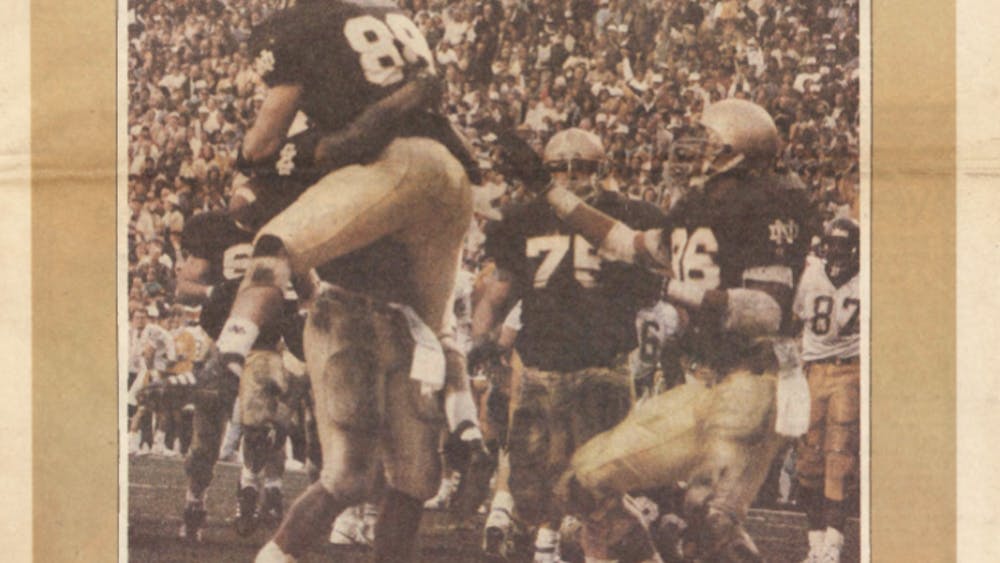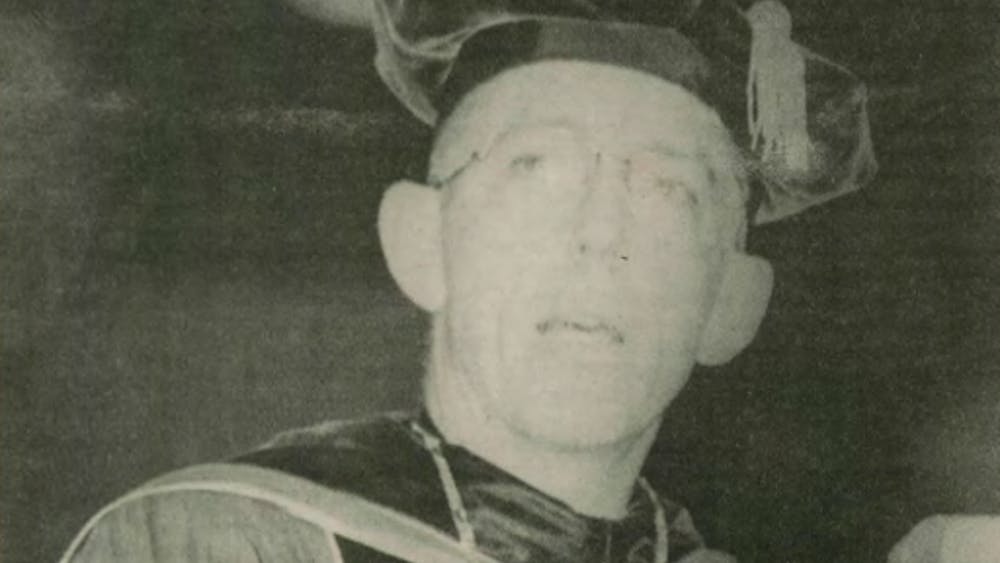In this edition, we delve into the nuanced narrative of Junior Parents Weekend (JPW) at Notre Dame. Initiated in 1953, JPW has since cemented itself as a core Notre Dame tradition, evolving from a single day of introductory activities into a weekend of familial engagement and University immersion. The articles we’ve researched shed light on various aspects of JPW, from its origins and evolution to the humorously detailed campus-wide evacuation plans for non-juniors. We explore how this event has become a unique intersection of academic and familial worlds, reflecting the changing dynamics between students and their parents. Through these stories, we gain insights into how JPW and the Notre Dame community have mutually influenced and evolved with each other.
JPW: A Steadfast Tradition
Feb. 15, 1985 | Claire Kneuer | Feb. 23, 1979 | Observer Staff | Feb. 20, 1953 | Scholastic | April 24, 1953 | Scholastic | Researched by Thomas Dobbs
The tradition of JPW at Notre Dame, inaugurated in 1953 as Parents-Son Day, has remained a cornerstone of the University’s student experience. Initially conceived as a collaborative effort between the Junior Class and the University administration, it was designed, in the words of Thomas W. Carroll from the Department of Public Relations, to “better acquaint students’ parents with the everyday life their sons lead on campus.” Parents-Son Day quickly evolved from a single-day affair into a weekend-long celebration, reflecting its immediate success and significance.
The inspiration of this tradition was highlighted by then-University President Rev. Theodore M. Hesburgh, who, in addressing the parents at the inaugural JPW, expressed a sentiment of inclusion: “I want you parents to feel you belong here at Notre Dame as your sons are the main part of our University.” His words established the cornerstone for what would blossom into a deeply cherished and increasingly inclusive tradition, as the weekend naturally expanded to include daughters following Notre Dame's decision to admit women in 1972.
Fast forward to 1985, the core principles and even schedule of JPW had remained remarkably consistent. The chairwomen of JPW in the same year, Julie Schuessler, captures its enduring spirit: “What is special about JPW is that it brings your two worlds together - the world of school meets the world of home.” This integration of the familial and academic spheres has been a hallmark of the JPW experience, offering a rare opportunity for parents to directly engage with the University community.
JPW: A Forum for Family and University Engagement
JPW: A Forum for Family and University Engagement
Feb. 15, 1991 | Andrew McCloskey | Feb. 15, 1992 | Fr. Robert Griffin | Feb. 19, 1998 | Fr. Jim Lies, C.S.C. | Feb. 16, 2001 | Mike Connolly | Researched by Thomas Dobbs
More than just a series of social events, JPW has served as a vital link between Notre Dame and its extended family. The 1991 Notre Dame London Program participants' formation of the letters JPW symbolized the anticipation and unity that this weekend fosters. The diverse schedule, including movies, a President's dinner, and various receptions, reflects the University's commitment to embracing and celebrating family involvement in the collegiate experience.
While JPW certainly offers parents a glimpse into the lives of their children on campus, it also presents an opportunity for faculty to speak directly to parents themselves. These events are marked by conversations that delve into the shared aspirations and concerns for the students' futures.
Take, for instance, the 1991 iteration of JPW, set amidst the Persian Gulf War. It offered more than just a platform for celebration; it was an avenue for serious, thoughtful dialogue. Fr. Robert Griffin eloquently captured the essence of this exchange in a letter to the campus paper. Reminding parents of their own Vietnam War experiences, he wrote, "The refrain of those years was, 'Give peace a chance,' so I supported the peace movement. When some of the students 'made love, not war,' I defended the students to their parents." He further argued that there was insufficient attention paid to the potential for a wider war in the Middle East and the concerns for students who, in the event of a draft, would be directly impacted by overseas conflicts.
In his 1998 article “Parents Say the Darndest Things,” Fr. Jim Lies offered a humorous yet insightful commentary on the evolving dynamics of family relationships, particularly relevant in the context JPW at Notre Dame. Fr. Lies reflected on the transition from adolescent embarrassment to adult appreciation of parents, a journey that mirrors the personal growth students experience at the University.
He amusingly recalled, “I don’t remember how long it took my Mom to learn not to embarrass me in public places.” Reflecting on the essence of the transformation both students and parents undergo, Fr. Lies further mused, “But it leads me to wonder if the reason we can invite our parents to campus during Junior Parents Weekend is because they have learned just enough so as not to embarrass us with privileged information.”
In 2001, Mike Connolly's (‘02) article, “Choices, Good and Bad,” offers an under-appreciated perspective on the importance of communication between students and their parents. “It wasn’t that my parents wanted to approve or disapprove of my decisions ... They just wanted to know what was going on,” he wrote. The widespread use of cell phones may have bridged this gap, yet it's undeniable that some students lament the era of constant connectivity, feeling burdened by the expectation of daily communication. Nevertheless, JPW is the ideal occasion to remind ourselves of the vital support we receive, in whatever form, from those in our lives. It's a celebration of shared experiences that acknowledges the critical role of parents in shaping the lives of Notre Dame students.
The Unpredictable Underbelly of JPW
Feb. 15, 1991 | Lisa Eaton | Feb. 15, 1991 | Lynn O'Donnell | Feb. 21, 2005 | James Vranish | Feb. 22, 2010 | Laura Myers | Researched by Cade Czarnecki
Junior Parents Weekend has long had a double meaning. To third-year students it signifies the crossroads of home life and school life — a time where parents both share and hear embarrassing stories about their kids. According to everyone else, JPW is one of the worst weekends on campus. Dating back to 1990, students have griped about the lull that sweeps across campus during JPW and results in a completely “dead” weekend.
Lynn O’Donnell, an Accent Writer in 1991, anticipated the impending boredom for non-juniors brought on by JPW, so she took it upon herself to create an itinerary for everyone looking to escape the quietness of South Bend during JPW. Some of her options for students looking to getaway included a ZZ Top concert, the Indianapolis Boat Sport and Travel Show, or a trip to the outlet malls in Michigan City.
But for the Juniors wrapped up in the craziness that is JPW, the weekend has historically brought more than enough action right to campus, even when there are no scheduled events. For example, James Vranish (‘06), a Junior in Siegfried Hall in 2005, informed the Observer that he spent JPW throwing snowballs at bewildered parents, including those of his girlfriend.
The most memorable aspects of JPW often arise from spontaneous moments. Laura Myers ('11), who was an Assistant Sports Editor in 2010, recounted her JPW experience with a mix of humor and bewilderment. Her highlights — or perhaps lowlights — included receiving a barrage of unsolicited professional advice, fielding numerous inquiries about her GPA, her mom urging her to do Tequila shots, and her mom deliberately attempting to shake hands with handsome young men during the Sign of Peace at Mass.
While experiences certainly differ, the legacy of JPW is that of memorable and spontaneous moments for Juniors and that of boredom and escape for everyone else. Regardless, JPW always reinvents Notre Dame campus life for everyone, even if only for a few days.










